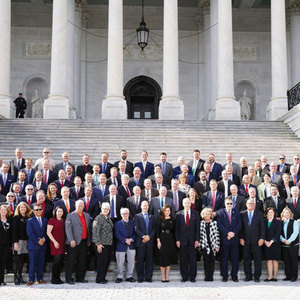The Importance of the Biodiesel Tax Credit

January 3, 2020
BY The National Biodiesel Board
In November, the National Biodiesel Board released a new report, “The Importance of the Biodiesel Tax Credit,” written by ABF Economics. It explains how tax and RIN credit values are crucial in helping biodiesel producers compete with petroleum and expand production. The report shows uncertainty surrounding tax credit reinstatement as a major reason the industry is operating below capacity. Ten biodiesel plants have cut production or closed in 2019, laying off workers in Georgia, Iowa, Indiana, Michigan, Mississippi, Pennsylvania and Texas.
The report was part of NBB’s all-out advocacy effort to achieve policy stability for the industry—not just on the tax credit, but on the Renewable Fuel Standard and international trade as well. NBB’s efforts were multiplied as 40 Democratic representatives sent a letter to House Speaker Nancy Pelosi in November, urging her to make the credit a priority before end of year. More than 145 businesses and trade associations also added their logos to an NBB-led letter to congressional leaders. NBB also brought more than 100 member-company representatives to Washington, D.C., for meetings with 88 Capitol Hill offices. Congress did not address the tax credit by the end of November, leaving it expired for two full years. NBB continues to advocate for a multiyear extension with retroactive availability for 2018-’19.
The tax credit isn’t the industry’s only source of uncertainty. U.S. EPA’s RFS small refinery exemptions destroyed demand for biodiesel and renewable diesel. Backlash against the August round of 31 exemptions prompted President Trump to promise change. EPA proposed and took comment on a method for estimating the exemptions as part of its 2020 rule. Unfortunately, the proposal didn’t match the president’s promise or restore lost gallons from prior exemptions. The backlash continued, even as biofuel supporters filed additional comments. Because EPA opened the supplemental comment period, it did not finalize the annual RFS rule by its Nov. 30 deadline. The industry continues to ask EPA to raise advanced biofuel volumes, properly address the 2016 waiver as directed by a federal court and include the best estimate of future exemptions—one based on a three-year average of past exemptions.
Another unresolved concern for U.S. biodiesel producers is the status of trade duties against Argentina. In early 2018, the U.S. Department of Commerce set duties on Argentina and Indonesia to counter years of unfair trade practices. Then, surprisingly, in November 2018, the department decided to reexamine the duties on Argentina and, in July, proposed to virtually eliminate countervailing duties. The commerce department did not finalize a decision by its original deadline, and the industry continues to wait for developments.
NBB’s efforts to secure certainty on these policy issues will continue in 2020. The biodiesel industry needs policy certainty to continue investments and growth in the competitive fuel market.
Advertisement
Advertisement
Advertisement
Advertisement
Related Stories
California’s new specified source feedstock attestation requirement: A critical new compliance step for renewable fuel producers
As of July 2025, California’s SCFS requires renewable fuel producers using specified source feedstocks to secure attestation letters reaching back to the point of origin. This marks a significant shift in compliance expectations.
The public comment period on the U.S. EPA’s proposed rule to set 2027 and 2027 RFS RVOs and revise RFS regulations closed Aug. 8. Biofuel groups have largely expressed support for the proposal but also outlined several ways to improve the rulemaking.
The U.S. renewable fuels industry on Aug. 8 celebrated the 20th anniversary of the Renewable Fuel Standard. Federal lawmakers also marked the occasion with resolutions introduced in the House and Senate earlier this month.
Iowa farmers have a new market opportunity for their 2025 soybean crop. Landus is expanding its Clean Fuel Regulation initiative, made possible by recent policy changes expected to increase Canada's demand for liquid biofuel.
Klobuchar, Moran introduce bipartisan legislation to support biorefineries, renewable chemicals, and biomanufacturing
Sens. Amy Klobuchar, D-Minn., and Jerry Moran, R-Kan., on July 31 announced the introduction of the Ag BIO Act. The legislation aims to update the USDA’s loan guarantee program to better support biorefining projects.
Upcoming Events










